- Home
- Richard Adams
Traveller Page 13
Traveller Read online
Page 13
Ajax struck me right off as a stolid, rather dull sort of fella. 'Twarn't so much that he didn't 'pear friendly as that he didn't seem capable of taking a lot of interest in anything much. Whatever come along, sun or storm, Ajax could take it--that was how I figured him out. No doubt, I thought, that would suit Marse Robert better'n a nervous, cowardly horse that had knocked him over and broke his hands. The only thing was, Ajax was sech a great big fella, a lot taller'n me, and I wondered whether that would altogether suit Marse Robert. Well, it wouldn't make no nevermind to me, I thought bitterly. Likely 'nuff I'd soon be pulling a wagon.
IX
Early September, 1862. The Army of Northern Virginia, having seized the opportunity to win a brilliant victory near Manassas, no more than twenty-five miles west of Washington, the Federal capital, has once again been unable to reap any true reward. Torrential rain has denied all chance of effective pursuit. The blustering General Pope, though duly suppressed, has been able to withdraw his army to defensive works between Manassas and Washington, too strong for the Confederate force to assail. Indeed, the victory was won only in the nick of time, for now strong Federal reinforcements under General McClellan have united with General Pope. Yet the greatest hindrance has been sheer exhaustion. The Confederate army is consumed by fatigue, by disease, by hunger and lack of supplies. The men are in rags, many lacking even boots, let alone protection against the weather. Only their supreme esprit de corps and above all their unbounded confidence in General Lee have held them together under hardships as severe as few armies have undergone.
Whither shall they go now and what should they do? They cannot remain where they are--a little south of the Potomac, at Leesburg in Loudoun County. That would court disaster. General McClellan is coming. To go south would take them into country already stripped of provisions. To go westward would be to retreat, to admit failure. General Lee (who has a broken bone in one hand and the other painfully sprained), considering the situation at his headquarters at the home of Mr. Harrison at Leesburg, has determined on the bold step of crossing the Potomac and advancing into Maryland. Whatever the risk, the effect of this will be to draw the Federals away from their Washington defenses and relieve, during the harvest season, their threat to Virginia and to Richmond. There may even, perhaps, be a chance to harass the enemy further. At all events it will be possible to subsist off the country. The army must eat.
To cross the Potomac; to invade Maryland? There is reason to believe in strong sympathy in that state with the Confederate cause; sympathy controlled only by the power of the Federal government and ready to show itself, given the opportunity. The Army of Northern Virginia includes many Marylanders--volunteers. It is even conceivable that Maryland may join the Confederacy.
Northward, then, from Leesburg to White's Ford and across the Potomac--a state boundary indeed, 500 yards wide--the long, stumbling columns splashing and wading through the river, watched in the distance by the ever-present Federal cavalry. But is the Confederate army indeed victorious or fugitive? They cannot hope to take Washington: they cannot hope for gain from another pitched battle. At Manassas they have already lost 9000 dead and wounded. What, then, is their hope? As always, it is for recognition of the Confederacy by the European powers and that the Federals, discouraged by Southern valor, will decide that the price is too high, give up and negotiate a peace conceding independence.
But the army! Ah, the army that passes over that river! You can smell them coming. Many of the local people stare incredulously--and fearfully, too--at these stranger vagabonds, scarecrows such as they could never have imagined in rumor, fancy or tales. Look, there is a boy, Leighton Parks, who has watched them crossing. "They were the dirtiest men I ever saw, a most ragged, lean and hungry set of wolves. They were profane beyond belief. Many of them spoke a thick dialect that I could scarcely understand." The lank, rib-cage horses with their ragged riders; the filthy, unshaven, cadaverous foot soldiers, blistered feet showing through broken boots; the artillerymen fearful for their jolting, tilting guns, for the rickety axles and unsteady wheels of their caissons. Whither are you marching, soldiers, in your squalor, your tatters and your spirits that nothing can subdue? You are marching toward the zenith of the Confederate cause. Never again will the world watch so closely and weigh the odds on your victory. Never again will these men, these horses and above all this spirit and hope press onward against the Northern enemy. Or if they do, the enemy will have grown too strong.
Come on out, Tom Nipper! Come on out o' that there fur! No use saying you ain't in thar! I see your eyes sticking out, see your paws hanging down!
Aw, Tom, you needn't get that huffy, start walking off. It's only my old soldier's joke. We had all kinds of jokes in the Army, y'know. "Come on out o' that hat!" and so on. Fellas got to have something to laugh at in hard times. An' for gosh sakes, warn't them hard times, too?
I guess you must be feeling times are kinda hard for you, Tom, huh? With Miss Life staying away so long? She's been away two months and more now--ain't it?--and likely to be as long again, or maybe more. But bless you, that don't amount to hard times. She'll be back one of these here days, and that's more'n can be said for lots I've knowed, horse and man.
Did you hear how Lucy finished her journey here, when she came with young Marse Rob? I never seed her come, but Ajax did, and he told me. She was pulling a buggy, that's what! Yeah; Lucy, that's been in four big battles and been under fire with me! Pulling a buggy! She never told me herself--no fear! She jest told me that after she'd been sent to the rear, nearly three years ago, there was some mix-up and she got picked up by some ornery fella back there. She told me how young Marse Rob found her and brought her here, but she never said he druv her here from the railroad pulling a buggy. You wouldn't never see me pulling no buggy, that's for sure. I never been in shafts and I ain't reckoning on it. I don't figure Marse Robert would care for that, nohow.
Say, did you hear the callithumps the boys put on last night? You didn't? I could hear it from here. I seed a callithumps or two myself 'fore now, when Marse Robert's ridden me downtown to keep an eye open for trouble. The boys march downtown blowing trumpets and banging away on any old thing they can find--drums, trays, old cans-- anything'll do, 'long as they make an infernal row. Put me in mind of old times, I declare it did. We had a band a-playing when we forded that there big river I was talking 'bout, but it would have taken more'n a band to put any heart in me jest then. Like I said, I figured me and Marse Robert was going to part.
Not that there was much show to the river crossing, Tom. Bless you, we warn't in no state to put on a show! Our fellas jest came up to the river and went wading acrost it. But when they came out the other side, they was all a-cheering, regiment after regiment. And there was one or two bands playing. I heared 'em.
Marse Robert was riding Lucy. Leastways, he was sitting in the saddle, but he couldn't use his hands on the reins. Dave was leading her, and Red Shirt was riding 'longside him an' keeping an eye on him to see nothin' went wrong. I was being led behind, with the rest of headquarters. When we-all came up to the ford, there was a whole lot of men--Red Shirt's men--a-Iaying in the road, waiting to go in and wade acrost. Red Shirt rides up to 'em and tells 'em to move out of the way for General Lee.
Soon's he heared that, Marse Robert calls out, "No, no, General Hill! Never mind that! Stay where y'all are." And then he told Dave to lead Lucy round the fellas, and we followed him over to t'other side.
'Tell you the truth, I don't recollect all that much 'bout the next two-three days, 'cepting that the roads was hard--a lot harder'n I'd ever knowed or been used to. There was any amount a-goin' on, but there was no more marching--or very little--and none of the soldiers at headquarters seemed to have time to do more'n groom me. I got very little exercise. The way I seed it, I was jest waiting around to be sent back acrost the river. We was in a nice spot, a grove of oaks, pretty close to where Old Pete was pitched. The trees smelt good and fresh; it was shady and the weather warn't too
hot, so the grazing was good. I made friends with one of our horses--Tempest, his name was. He reminded me, some ways, of Ruffian, him as was my friend in the old days back at Andy's, when we used to stand head-to-tail under the trees, groom each other and swish the durned flies. I've always been proud of my long, thick tail, y'know, and Marse Robert never would have it cut short.
Now I come to look back on it, that was a real good place, and I'd 'a been happy 'nuff and glad of the break if only I hadn't been so durned miserable wondering when I was going to be sent away. Yeah, I'd forgotten all bout Tempest. Wonder whatever become of him? Horses forever saying good-bye.
Headquarters was jest a bunch of tents, like it mostly was. Marse Robert didn't like to live in a house, even if'n he sometimes spent a night in one here and there, like I've been telling you. I could see his tent from the picket lines, and often I'd see his lamp burning away at night, and people a-coming and going, the light showing a long time after darkness had fallen.
One night a funny thing happened. I was jest rambling round where I was picketed, and either the peg up and pulled out or the rope come loose--I don't rightly know. Anyways, I found I was loose. I rambled round for a while, ate some grass in the moonlight and nickered to one or two other horses. Nary a sentry that I seed. And then, suddenly, I got the smell of Marse Robert, floating on the air from a little ways off. So I jest followed it, walking easy, and 'course I was going towards that lighted tent. When I got quite close up, I could hear Marse Robert's voice, so I reckoned there must be someone else with him--Old Pete, maybe, or another general. But I couldn't smell anyone else, or hear anyone answering Marse Robert. His voice was real low--near'bouts to whispering--and didn't sound 'zackly like he was talking to 'nother fella at all.
I went up to the tent and pushed my nose through the flap; and there was Marse Robert on his knees, with his hands together, same's them soldiers 'fore the battle, and he 'peared to be talking to hisself, like I've heared a groom do in stables sometimes. He had his back to me, and it took him a moment or two to realize I was there. When he did, he gave a little start, but then he got up straightaway and came out of the tent.
"Why, Traveller," he says, "come to look for me, have you? I should have come to look for you." Then he said some more I couldn't understand, but he was stroking my nose and speaking real kind and quiet all the time. I guess I must 'a been trailing my rope, 'cause I recall he led me back to the picket lines hisself, and I believe he'd have fastened me up with his own hands, only they was still bandaged up and splintered. He called a sentry, and I was picketed back in my place 'longside Lucy. Lucy never asked where'd I'd been nor nothing, but that was jest like her--she was never 'quisitive--and anyways she was so new to the Army that I reckon maybe she thought it was ordinary for headquarters horses to go wandering 'bout on the loose at night. So no one knowed, 'cepting for me and Marse Robert and the sentry.
I don't think it was the next day--maybe it was the day after-- that Dave came down to the picket lines with my girth over his arm, and carrying my saddle. I thought he must have made a mistake and in a minute he'd go back for Lucy's, but he didn't. He saddled me up and 'fore I knowed what was happening I found myself up at the headquarters tents. There was Perry lecturing Marse Robert and giving him his hat and things, like he always did. He never gave him his big gloves, though. They put some kind of special gloves, made of sacking, over his bad hands. I was still wondering whether they'd made a mistake when Marse Robert spoke to me a moment and then got up into the saddle. He looked around, said something to Major Talcott and then, jest like he always did last thing before we started out in the mornings, he gave the order: "Strike the tent!" That meant that Bryan and Perry and the rest was to get packed up and moving.
Old Pete joined us directly. "You're back then, Traveller?" says Hero. '"Reckoned you would be." I was still too much surprised to answer him, 'cepting for a friendly nicker. What was holding my attention was the change in the whole feel of Marse Robert. He warn't using his hands on the reins--well, not hardly at all. We was on a pretty smooth track to begin with and then we went out onto the road, so 'twarn't difficult for me to know where we was s'posed to be going. After a while, though, we came to some rough ground where the road was in bad repair, and I realized right away that Marse Robert couldn't use his hands to guide me. Dave rode up 'longside and took the bridle for a spell, and this worked well 'nuff--we warn't going no faster'n a walk. I didn't get no encouragement to break into my usual trot.
We hadn't gone more'n three-four mile--I remember the sun was right in our eyes as we went down the road--when I heared the guns in front of us. We was going straight toward them guns; they was up in the hills. And I knowed then--picking my way acrost that rough ground, with Dave's hand on my bridle--I knowed that I'd somehow changed. Not that I'd stopped being afeared--I'd always be afeared; no horse could help that--but I knowed I'd rather be with Marse Robert and do jest what he wanted me to do--I'd rather be with him than even save my life. I realized, too, that this was the way Skylark felt and Sorrel felt--only, they hadn't told me as much, 'cause it was something they couldn't.
Well, I'm not really explaining very well, Tom. I guess I'm not managing to make you understand that this was a mighty big change in me--bigger'n anything before or since. I'd thought before that I was Marse Robert's horse and real close to him, understanding jest what he wanted and all the rest. But I hadn't been--I was jest a good, strong horse that suited him better'n any other, and I'd thought that was all there was to it. Now I realized 'twarn't hardly a mouthful of it. The reason Marse Robert didn't 'pear to care 'bout the bangs was that he cared more for the Army--for our soldiers--than he did for his own life. I don't know whether I can put this to you jest rightly, Tom. I'll tell you something I remember. Once, when me and a couple of other horses was jest browsing round in some long grass, tearing it out in mouthfuls, you know, I came on a bird's nest in among the brush and undergrowth--one o' them flycatchers, maybe. The fledglings had hatched: the nest was full o' them. And the mother bird went for me-- she sure 'nuff did. She jest went for my nose and pecked me for fare-you-well, and a-chattering with rage all the time. She'd have done the same to you, Tom, or to anything else that threatened her young 'uns. She didn't care 'bout herself at all. 'Course I jest backed off and left her. I warn't aiming to hurt no nest.
Marse Robert needed me to feel 'bout the soldiers the way he felt hisself. And what it really come down to was I had to do jest what he wanted, 'cause I was the one critter in the whole Army closest to him-- yeah, closer'n Perry, even if'n I didn't clean his boots. I knowed now that he'd never meant to send me away on account of I'd hurt his hands. That warn't why I'd changed--not the fear of bein' sent away. It was realizing that unless I could act like Marse Robert, I warn't his horse in the same way that Sorrel was Cap-in-His-Eyes' horse. And I'd been wrong: Marse Robert could be blowed to pieces, jest like anyone else. And if that happened, then I'd be blowed to pieces 'long with him, and that'd be better'n not being entirely his horse. It hadn't been like that before, but 'twas sure 'nuff like that now. I had either to go on or go back. I went on. You might say I gave myself up for dead. But I knowed then what I hadn't knowed before--that most of the Army had done that anyways.
All the same, Marse Robert and me didn't come under fire that day. Marse Robert was urging the soldiers on, telling 'em to keep moving through the dust and up towards the hills. In the afternoon, when we came close to the battle, he told Dave to pull me in to the side of the road, and we watched the men go by. I remember them Texans and their young General Hood. Marse Robert was talking to him real serious for some time, and when he finally rode off, all the Texans was a-cheering and yelling like crazy. I almost felt sorry for the Blue men they was fixing to fight. I wouldn't have cared to meet 'em, I'll tell you.
I could tell that Marse Robert was strung-up and anxious 'bout the battle, but his hands was so bad off that he didn't feel he could get forward and run it hisself, like he usually did. The firin
g went on until well after dark, and I knowed, from the way the horsemen who kept coming up to us was speaking to Marse Robert, that our fellas must be in a bad way and Marse Robert was worried.
Whatever else he had to worry 'bout, I thought, 'twarn't going to be me. Not no more.
We was on the march again in the dark. Everything I remember 'bout that night's confused. We crossed a creek and came to a little town. All I recollect 'bout the next day is the Blue men coming up, more and more of 'em in the distance. 'Peared like there was no end to 'em. All that evening they was coming up and deploying, and yet they didn't try to fight us; nor the next day, neither. I reckon they was scared, although they was so many. They didn't like the look of us. I didn't like the look of them, neither.
Cap-in-His-Eyes came riding Sorrel into camp and Old Pete and him was talking with Marse Robert and riding up and down the lines. I remember the guns firing. Sometimes Marse Robert rode me and sometimes he rode Lucy. I guess he wanted to get the feel of Lucy and get her accustomed to the guns. I remember him leading me through that little town by the bridle. It was full of our guns, and Marse Robert went here and there, talking to the gunners. There was nothing to eat-- no hay, no oats, no nose bags going--and Lucy and me and the rest had to grab what grass we could get. Mighty poor stuff, too. Oh, and that evening it rained. 'Peared like it always rained when we was fixing to fight.
The fighting began before morning, in the dark. I could hear the muskets from where we was stationed, up on a hill outside the town. But 'tell you the truth, Tom, I only recall things here and there out of that terrible day. 'Pears to me now that Marse Robert spent the whole time riding up and down, over the ridges, out of one valley and down into the next. I jest see things in my mind's eye, you know. I recollect Cap-in-His-Eyes a-sitting on Little Sorrel with one leg acrost the saddle, taking not the least notice of the shells a-bursting everywhere round him and eating peaches out'n a paper sack. I felt sure Sorrel would be killed--the fields and brush everywhere was filled with dead horses-- I seed more dead horses and mules that day than I ever knowed was in our Army. Yet he warn't, nor Cap-in-His-Eyes warn't neither.

 Watership Down
Watership Down Tales From Watership Down
Tales From Watership Down Maia
Maia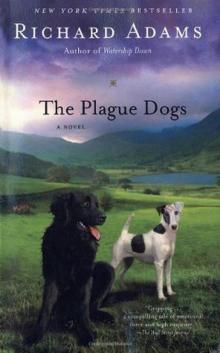 The Plague Dogs
The Plague Dogs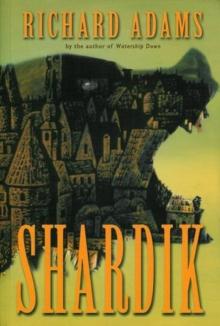 Shardik
Shardik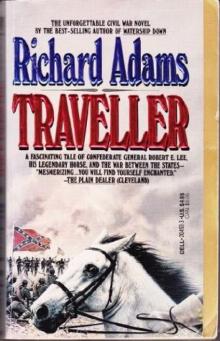 Traveller
Traveller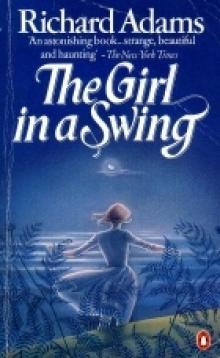 The Girl in a Swing
The Girl in a Swing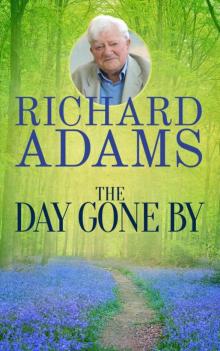 The Day Gone By
The Day Gone By Daniel
Daniel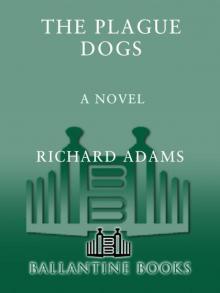 The Plague Dogs: A Novel
The Plague Dogs: A Novel